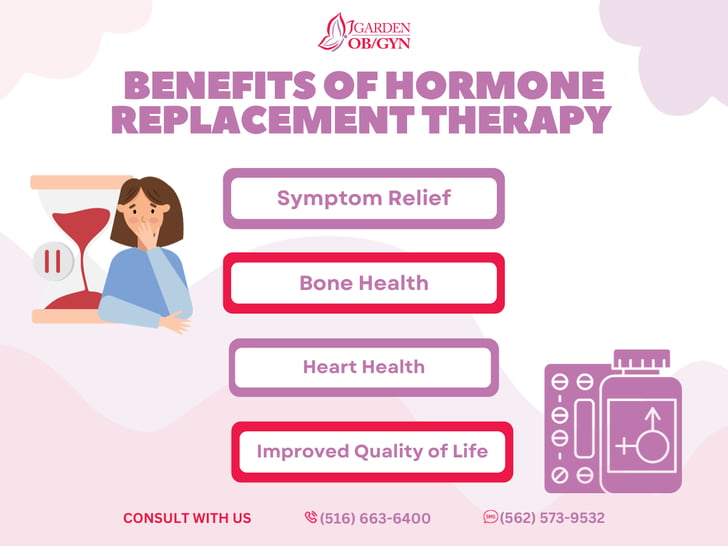Hormone Replacement Therapy for Menopause
Menopause, around 45-55, ends a woman's reproductive years, causing hormonal changes. Symptoms impact quality of life, but Hormone Replacement Therapy (HRT) offers relief. This article explores menopause, its symptoms, and HRT's role.

Menopause is defined as the cessation of menstruation for at least 12 consecutive months. It occurs as a result of the ovaries producing fewer hormones, particularly estrogen and progesterone, which play a crucial role in regulating the menstrual cycle and maintaining bone density. As hormone levels decline, women experience various physical and emotional changes, collectively known as menopausal symptoms.
Common Menopausal Symptoms
-
Hot Flashes and Night Sweats: Sudden, intense sensations of heat, often accompanied by sweating and a rapid heartbeat, can disrupt sleep and daily activities.
-
Vaginal Dryness: Reduced estrogen levels can lead to vaginal dryness, itching, and discomfort during intercourse.
-
Mood Swings: Hormonal fluctuations can contribute to mood swings, irritability, and increased risk of depression and anxiety.
-
Sleep Disturbances: Night sweats and hormonal changes can disrupt sleep patterns, leading to fatigue and irritability.
-
Bone Health: Reduced estrogen levels increase the risk of osteoporosis, a condition characterized by weakened bones that are more susceptible to fractures.
-
Changes in Libido: Many women experience a decrease in sexual desire and discomfort during sex due to vaginal dryness.
Hormone Replacement Therapy (HRT)
HRT is a medical treatment designed to alleviate the symptoms of menopause by replacing the hormones that the body is no longer producing in sufficient quantities. It primarily consists of estrogen and, for women with an intact uterus, progesterone. There are different forms of HRT available, including:
-
Estrogen-Only Therapy: This type of HRT is recommended for women who have had a hysterectomy (surgical removal of the uterus). It can effectively relieve symptoms such as hot flashes and vaginal dryness.
-
Combination Therapy: Women with an intact uterus are typically prescribed a combination of estrogen and progesterone to reduce the risk of uterine cancer associated with estrogen alone. This form of HRT is often more effective at managing menopausal symptoms.
-
Low-Dose and Transdermal Options: HRT can be administered through various methods, including pills, patches, creams, and gels. Low-dose and transdermal options are sometimes preferred to minimize side effects.
Benefits of HRT
-
Symptom Relief: HRT is highly effective in reducing the severity and frequency of hot flashes, night sweats, and vaginal dryness.
-
Bone Health: Estrogen replacement therapy can help maintain bone density and reduce the risk of osteoporosis-related fractures.
-
Heart Health: Some studies suggest that HRT may have a protective effect on the cardiovascular system, reducing the risk of heart disease in younger menopausal women.
-
Improved Quality of Life: Relief from menopausal symptoms can lead to an improved overall quality of life, including better sleep and mental well-being.
Risks and Considerations
While HRT can be a valuable tool in managing menopausal symptoms, it's essential to consider potential risks and individual factors. Some important points to keep in mind include:
-
Breast Cancer: There is a slight increase in the risk of breast cancer associated with long-term HRT use. Women considering HRT should discuss this risk with their healthcare provider.
-
Blood Clot Risk: HRT may increase the risk of blood clots, especially in women who smoke or have other risk factors.
-
Individualized Approach: HRT is not suitable for everyone. The decision to pursue HRT should be individualized and based on a woman's medical history, risk factors, and symptom severity.
-
Alternatives: Some women may prefer non-hormonal treatments, such as lifestyle modifications, herbal remedies, or cognitive-behavioral therapy, to manage their menopausal symptoms.
Menopause is a natural phase of a woman's life, but its associated symptoms can be challenging to navigate. Hormone Replacement Therapy (HRT) is a valuable option for women experiencing severe menopausal symptoms, providing relief from hot flashes, vaginal dryness, and more. However, the decision to pursue HRT should be made in consultation with a healthcare provider, considering individual health factors and potential risks. Ultimately, the goal is to help women transition through menopause with as much comfort and well-being as possible, ensuring that this natural life stage doesn't impede their quality of life.
































